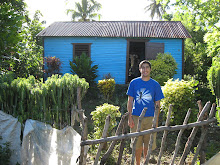
This was the hardest post to write. When I arrived in the DR three Septembers ago, I looked forward to over two years of time in the Dominican Republic, and saw the day that I would leave my adopted country as so far off in the future as to not merit thinking about. Well, that day has come and gone. I have left my home, my neighbors, my friends. I felt, however, that it was time. Sure, I was comfortable there, I was used to my way of life. The comforts that we take for granted so much here I might have lacked, but I didn’t miss them, I functioned and even flourished and in the context of my environment. Maybe that was a sign that I had to move on. I had found living there (relatively) easy, effortless. I knew what to expect, how to deal with problems and challenges. I knew what was going to work (not much) and what wasn’t. I did what I could with my project and community partners. I didn’t accomplish everything I wanted to, but I don’t leave empty-handed. We worked hard, and met with some success. Plenty of people doubted that we could even get anything done, and certainly did their part in trying to hamper progress. As my sector coordinator said, I definitely arrived idealistic and optimistic that I could affect some sort of change in my little corner. My hopes were quickly dashed on the rocks of historico-cultural inertia, and what I saw as a lack of institutional support from my local partner agencies.
Pero nada, as they say, I moved forward. I ended up loving my campo, and the people in it, for all the difficulties we had on a professional level. Personally, they welcomed me with open arms. They couldn’t have been more warm and open. I moved into a community of people I had never met, and who knew nothing about me besides my nation of origin, and became family. I know I could never really become a Dominican; I felt more like a long-lost cousin who came back for a bit from Nueba Yol. Their ability to act as they did towards me was astounding – no American community would be able to do that.
So leaving all of that was difficult. Of course, I also had all of my Peace Corps friends, many of whom were extending their service in the country. I had also met people who arrived in country after me, and I would be leaving them, too. At times it felt like I was the only one who was leaving the country.
The night before I left my village, my friends and neighbors put on an inauguration of the stove project, and put on a despedida, or goodbye party, afterwards. All sorts of people showed up, including my erstwhile project partner, my APCD, and various Peace Corps friends. There were speeches, certificates, and tears (from doñas, not from me). The doñas didn’t stop there – they made an enormous sancocho that fed at least all 75 people that were there. It was pretty expensive, but well worth it. And finally, my host mom, forever the politica, finagled a set of giant speakers (the ones they have on the back of the campaign trucks) to play all the hits for three hours. We had a dance party on her lawn. All the muchachos were there. It was glorious. After that madness was over, a few PC amigos came to stay at my house, where we had our sort of afterparty, and ended the evening with a bang. It couldn’t have been a better last evening.
I am sad I had to go. It was a bittersweet farewell, but well worth it. I wish the best to my PC colleagues and friends and hope that my neighbors continue to work to improve their quality of life as I know they can. Siempre tenga esperanza.




